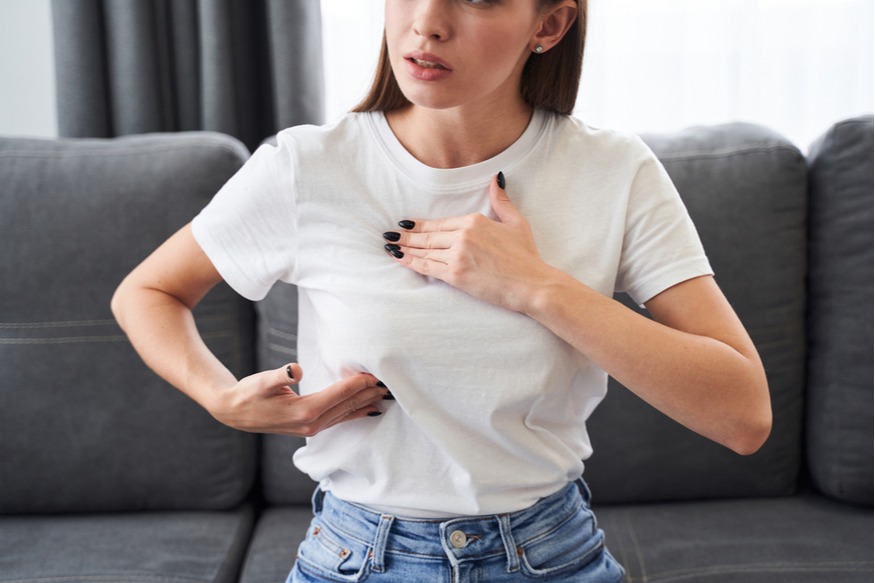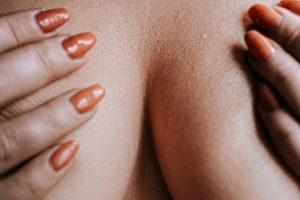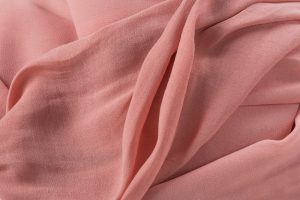
What causes breast pain?

Many women experience breast pain at some point in their life. This subject isn’t talked about much, even though one in ten women experiences this type of discomfort on a regular basis. The main cause of breast pain? Hormones. Find out in this article what you can do about it.
I have sensitive and painful breasts
Let’s start by emphasizing that sore breasts are not an indication that there is something wrong. Your breasts go through a lot of changes in your life: from puberty to hormonal changes to breastfeeding. When we say sensitive breasts we mean sore, swollen, or painful breasts. The medical term for breast pain or a breast condition is mastopathy. Mastos means breast, pathos means condition.
Possible causes of breast pain
Growth during puberty
Some girls have very sensitive breasts when they’re going through puberty. This is because breast gland tissue usually starts to grow when a girl is around the age of 11 or 12. That pain is similar to the pain some women experience during menstruation or ovulation.
During your cycle
Hormonal changes influence your breast glands. That’s why your breasts can feel extra sore during ovulation or menstruation. Your circulation improves, which can make your breasts feel more sensitive and painful. Your gland tissue probably feels a little lumpier and cysts can become more prevalent during this time in your cycle. It’s also possible that your breasts swell up significantly right before your menstruation starts.
Also read: 28-day cycle; enjoy the ride
You’re pregnant
Even before taking a test, some women already know that they’re pregnant. How? Sore breasts. When you’re pregnant, your body starts preparing itself for breastfeeding. This can make your breasts feel extra sensitive, tight, or sore. From about the fifteenth week of pregnancy, the cells that produce breast milk are activated. In week 22, the cells actively start to produce milk. Your nipples and areola’s may start to look different as well.
You’re going through menopause
Menopause involves a lot of hormone changes, which can cause breast pain. After the menopause, the gland tissue in your breasts grows smaller, but just like the growth of breasts during puberty, this process takes years. If you’re taking hormones during menopause, your breast tissue becomes more dense. The pain and discomfort usually goes away after the menopause.
You’re taking the pill or other medication containing hormones
Medication containing hormones, like the contraceptive pill or some antidepressants can influence the sensitivity of your breasts. It can help to start taking the pill, stop taking the pill, or switch to another pill, depending on your situation. Contact your GP for more information about this.
Breast pain caused by stress
If you’re stressed, your muscles, including your breast muscles, tighten. This can make your breasts feel sore and sensitive.
Cysts in the breasts
Cysts in the breasts are very common and are usually harmless. A cyst is a pocket that fills with fluid and can grow up to a couple of centimeters. A cyst can form fairly suddenly in a milk duct. It’s possible that it goes away on its own, after menstruation for example. If a cyst causes a lot of pain, a doctor can drain the fluids to alleviate the pressure.
Fibroadenoma
Lik a cyst, a fibroadenoma is a benign lump in the breast. A fibroadenoma consists of connective tissue, which pushes the other tissue aside. If necessary, the lump can be removed. Sometimes going for regular check-ups is necessary.
Breast pain: do I have breast cancer?
There is a lot of attention for breast cancer in the media. One in seven women gets breast cancer at some point in her life. It’s important to check your breasts regularly. The best moment to do this is a week after the first day of your menstruation, says Léonie Smit, oncological surgeon at Mammacentrum Treant Zorggroep. Your breasts are at their least sensitive at that point and they also don’t respond as much to hormonal changes. Breast pain almost never indicates breast cancer. However, it’s important to report any changes in your breasts to your GP.
How to reduce breast pain?
If your breast pain is really bothering you, try the tips below to alleviate the pain.
- Wear a good bra that offers plenty of support. A sports bra is a good option for example. Make sure you wear the right size bra. Shop assistents in lingerie shops can help you with this as well.
- A warm shower can help alleviate the pain. If it does, try wearing warm clothes during the day. A hot water bottle sometimes helps manage the pain as well.
- Cold works really well for some women, but for others it only increases the pain. So this is a matter of trying it for yourself. Wrap a coldpack or ice cubes in a towel and place it on your breast.
- Primrose oil is able to relieve pain in about 40% of women, according to Isala hospital. It does take about three months before it starts to work however. It’s available in various shapes, but softgel capsules are most common.
- Lowering or completely putting a stop to your intake of coffee, tea, chocolate, cola, wine, and cheese can help with breast pain, as well as eating more unsaturated fatty acids: margarine light and cooking fat or oil. This remedy also takes about three months to take effect.
- Doctors often recommend taking paracetamol to manage breast pain.








Respond or ask a question
0 comments